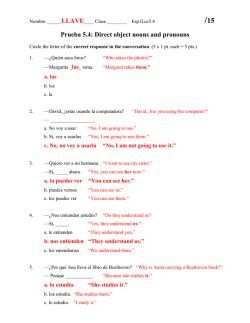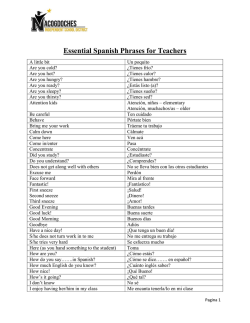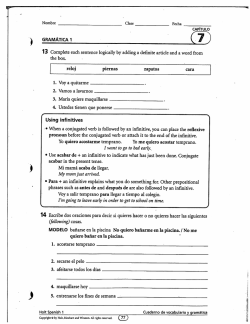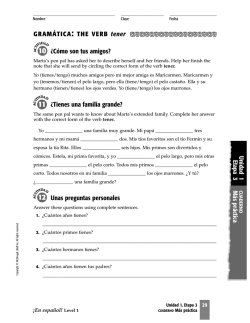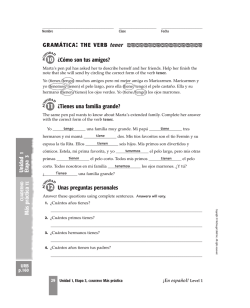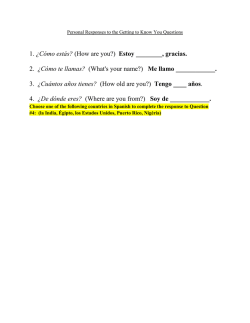
DIRECT OBJECTS (DO) and PRONOUNS
Nombre ____________________________________ Fecha ________________ Clase ____________ Esp1Lec5.4 DIRECT OBJECTS (DO) and PRONOUNS A DIRECT OBJECT NOUN receives the action of the verb directly and generally follows the verb. In the example above, the direct object noun answers the question: What are Álex and Javier taking? They are taking photos. THE PERSONAL “a”: When a D.O. noun in Spanish is a person or a pet (not an object or place), it is preceded by the word a. (There is no English equivalent for this construction.) ----------------------------------------------------------------------------------------------------------------DIRECT OBJECT PRONOUNS (DO) are words that replace direct object nouns. Like English, Spanish sometimes uses a DO pronoun to avoid repeating a noun. Direct Object pronouns me nos te os lo / la los / las The DO comes before the verb in a sentence: Positive statement Negative statement Verb in the Infinitive (not conjugated): The DO pronoun can be placed before the conjugated form or attached to the infinitive. Present progressive: The DO pronoun can be placed before the conjugated form or attached to the infinitive. ¡Atención! Watch when to use an accent mark to maintain the proper stress. Choose the correct DO pronoun: 1. Tienes el libro de español. a. La tienes. b. Los tienes. c. Lo tienes. 2. Voy a ver el partido de baloncesto. a. Voy a verlo. b. Voy a verte. c. Voy a vernos. 3. El artista quiere dibujar a Luisa con su mamá. a. Quiere dibujarme. b. Quiere dibujarla. c. Quiere dibujarlas. 4. Marcos busca la llave. a. Me busca. b. La busca. c. Las busca. 5. Rita me lleva al aeropuerto y también lleva a Tomás. a. Nos lleva. b. Las lleva. c. Te lleva. 6. Puedo oír a Gerardo y a Miguel. a. Puedo oírte. b. Puedo oírlos. c. Puedo oírlo. 7. Quieren estudiar la gramática. a. Quieren estudiarnos. b. Quieren estudiarlo. c. Quieren estudiarla. 8. ¿Practicas los verbos irregulares? a. ¿Los practicas? b. ¿Las practicas? c. ¿Lo practicas? 9. Ignacio ve la película. a. Ignacio la ve. b. Ignacio o ve. c. Ignacio as ve. 10. Sandra va a invitar a Mario a la excursión. También me va a invitar a mí. a. Los va a invitar. b. Lo va a invitar. c. Nos va a invitar. DO pronouns:
© Copyright 2026
